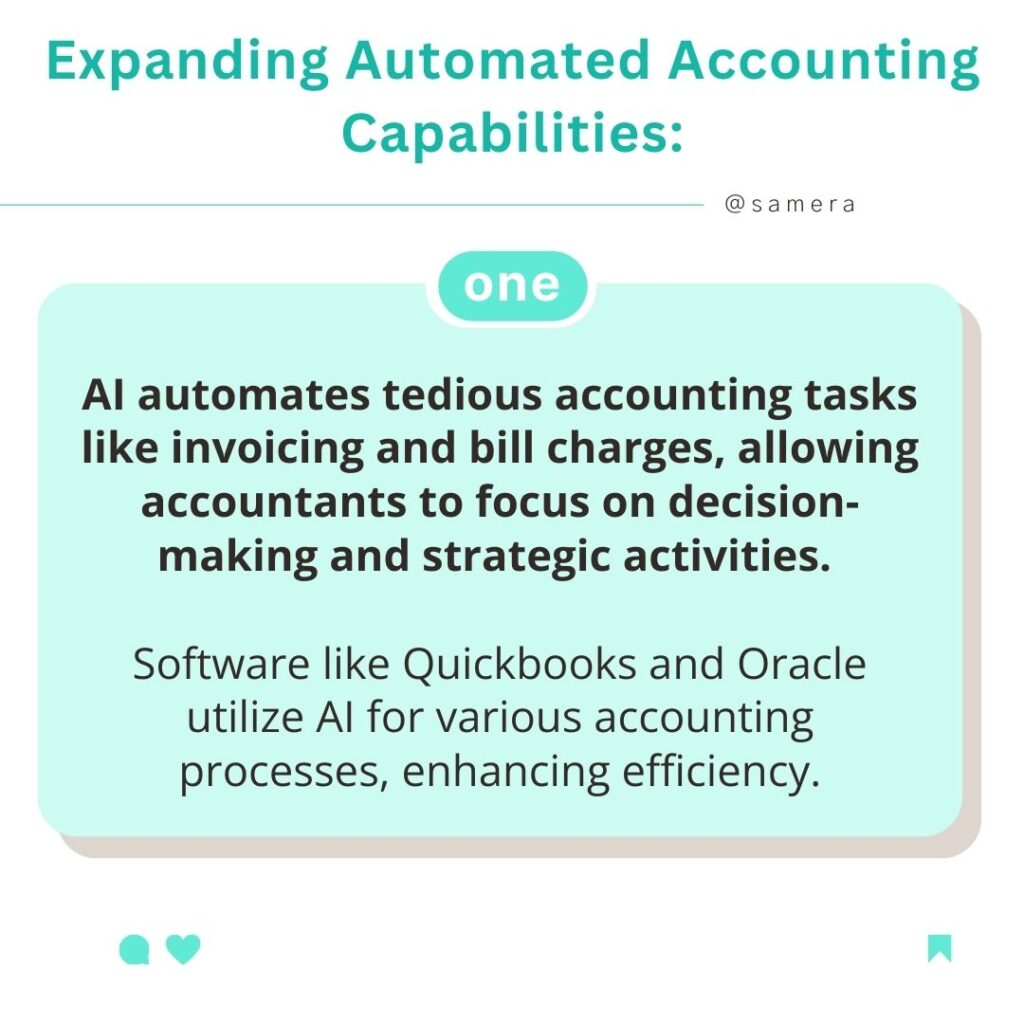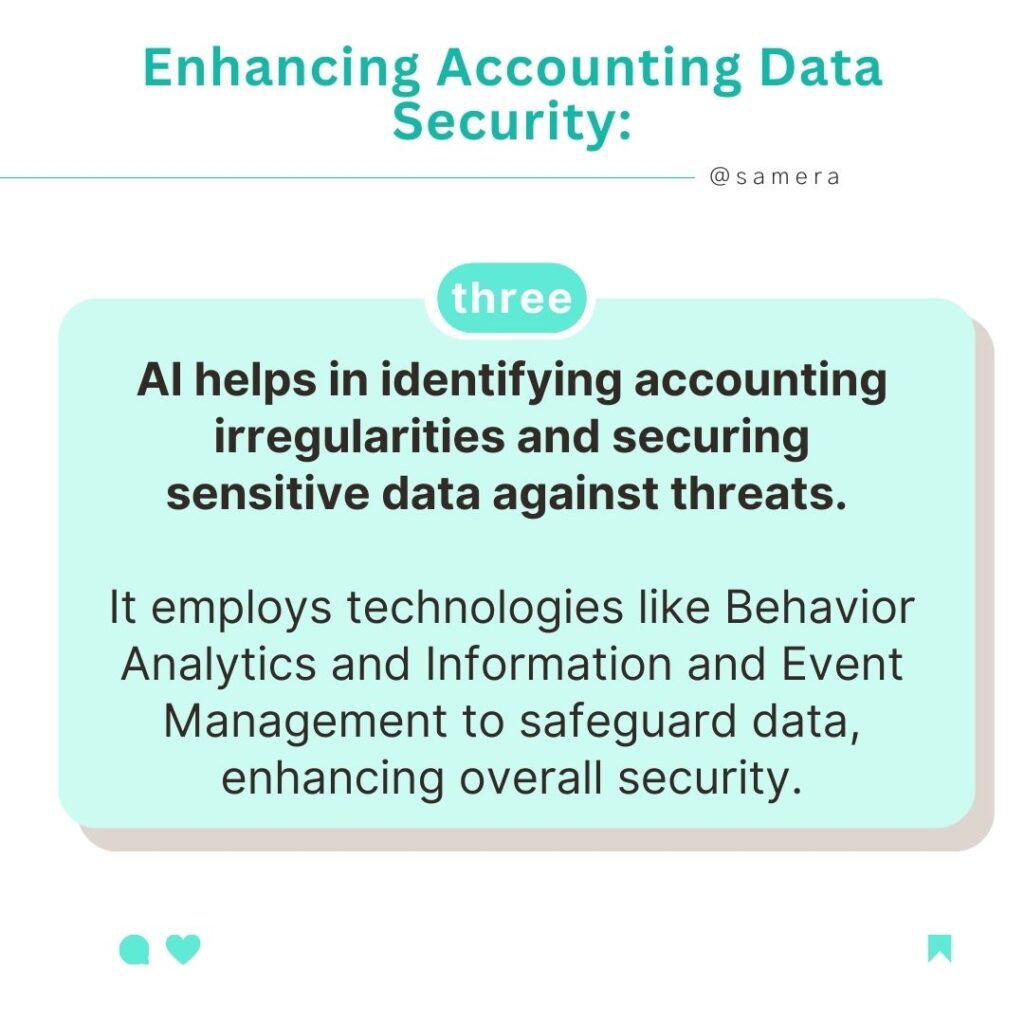In the next few years, intelligent systems will take over an increasing number of decision-making processes. Although accountants have always used technology to enhance their work and add more value to organizations, this is a chance to rethink and significantly raise the bar for business and investment choices, which is the profession’s ultimate goal. The profession must concentrate on the core business issues it seeks to resolve and consider how new technology can alter how it approaches these issues in order to realize this promise.
Of all emerging technologies, AI is the one that is slated to have the biggest impact in the accounting, finance, and auditing space. AI-driven solutions have the potential to be highly strong and are advancing swiftly. They provide results that, in certain situations, vastly outperform human efforts and can be exceedingly precise. They do not, however, mimic human intellect. The best ways for people and computers to collaborate need to be understood, along with the strengths and limitations of this unique sort of intelligence.
In this blog, we go over 4 ways in which AI is going to prove game-changing for the accounting and bookkeeping function and explore in greater depth what promise AI truly holds for the accounting industry.
Understanding Artificial Intelligence in Accountancy
Even though the rate of development is quick and AI methods like machine learning are not necessarily new, the accounting industry has not yet widely applied it. Data and automation are the two main focuses of AI in accounting. Machine learning, an AI-powered technology, can lead to new and better methods for data analytics in accounting, which can open the possibility of leveraging AI in addressing greater accounting and auditing problems, and developing the abilities of accounting professionals like accountants, CAs, and CFAs need to engage with emerging technologies to shape up a better accounting future.
Leading cloud-based accounting software Sage finds in their Practice is Now report that nearly 58% of accounting professionals agree that AI in accounting will bring a positive change in their organisations [1]. Let’s explore the ways in which this positive change will unfold.

4 Next-Gen AI Applications in Accounting
Expanding Automated Accounting Capabilities
Accounting automation enables accountants to forego a number of tedious yet time-consuming accounting chores, such as invoicing and bill charges. With the automation of numerous accounting procedures, CPAs are going to be able to leverage data to arrive at decisions for businesses that will satisfy both customer and corporate needs. In fact, most accounting software used today already have an element of AI incorporated which accountants use on a daily basis.
For instance, Quickbooks employs AI to automate several back-office activities, such as payroll, smart match reconciliations, and cash flow forecasts. Oracle, another cloud-based platform, uses advanced enterprise resource and financial planning techniques powered by AI-driven Machine Learning (ML) models. Finally, AI is also utilised by cloud-based accounting software FreshBooks to automate accounts payable and a number of other bookkeeping and accounting operations.

Exploiting Invisible Accounting
With Invisible Accounting, AI helps users understand financial data with utmost clarity. AI enhances the quantity of data and enables the elimination of repetitive activities from an employee’s daily job, resulting in deeper insights and better financial visibility. AI-powered Virtual Assistants and Chatbots are also key parts of Invisible Accounting and allow both professionals and end-users to save on time, improve efficiency, and accounting outcomes. This happens as AI fills up gaps in skills and understanding since AI algorithms are always evolving to keep up with changes in the industry.
Large organizations can use Invisible Accounting to minimise human anomalies like duplicate invoicing and accounting fraud. In order to prevent businesses from shelling out money for unnecessary charges, Invisible Accounting can identify correlations or relationships between payments and recognized dangers. Sage is already at the forefront of realising the powers of Invisible Accounting, offering capabilities like VAT automation, enabling application users to save more time for their customers and deliver better business, value, and customer experience – the last of which is something that accounting companies are just heeding.

Enhancing Accounting Data Security
Sensitive accounting data, which can be exploited by both external adversaries and insiders, needs encryption-driven security measures in place. Here, AI can help spot accounting irregularities like duplicate invoices or find connections between payments that appear to be harmless to the human eye. Assigning expenditures to the appropriate categories can also assist to ensure that the business does not pay for things it should not. Practices may greatly enhance compliance procedures and safeguard both their own and their clients’ funds by employing automated anti-fraud and finance management solutions.
Many of the risks and dangers to data security can be managed by AI-driven security solutions like Behaviour Analytics and Information and Event Management. These security technologies use artificial intelligence (AI) to gather, track, and analyse data from computer activity to flag questionable behaviour. This occurs as models pick up on patterns of appropriate access usage and utilize these patterns to identify sophisticated assaults like insider threats by seeing actions that suggest malice and endanger important data.

Unlocking Constant Precision Auditing
Auditing is central to the function of accounting as a whole. Again, AI offers exciting avenues to optimise audits and reduce accounting errors and discrepancies. Also, the audit process is made more secure by AI-led digitisation. With AI, auditors can monitor every accessed file by using a digital tracker. Digital data offers the promise of making the auditing process easier rather than having to sift through every paper document.
In order to customise the audit program to concentrate on the most important components, AI and smart algorithms can help analyse the data of a firm and identify the risks and abnormalities. It lowers risk and expense for all parties concerned. Therefore, the digitalisation process in auditing results in increased audit accuracy. AI in auditing enables the accurate and efficient recording of every financial transaction made by the organization, allowing for highly accurate audits.

Did You Know?
- 60% of accountants believe that AI will have a significant impact on the accounting profession in the next five years. (Source: Sage, 2023 Practice is Now Report)
- AI-powered accounting software can save businesses up to 40% on their accounting costs. (Source: Association of Certified Public Accountants, 2023)
- AI can help accountants automate up to 80% of their repetitive tasks. (Source: Deloitte, 2023 AI in Accounting Report)
- AI can help accountants improve the accuracy of their audits by up to 90%. (Source: PwC, 2023 AI in Auditing Report)
- AI can help accountants identify and prevent fraud more effectively. (Source: American Institute of CPAs, 2023 AI in Accounting Report)
Conclusion
Building knowledge of the practical applications of AI throughout business and accounting operations today and in the coming years will be crucial for how the future of AI and accounting shapes up. Business owners, accountants, and even non-accounting professionals must be aware of the effects that AI and machine learning will have on the accounting and bookkeeping industry if they want to remain adaptive and maintain an edge about themselves. To remain competitive, it is necessary to adapt, learn, and evolve in respect of AI.
The use of AI in accounting provides a seamless procedure and enables accounting companies, CFA firms, banks, and financial businesses to offer their clients more value and better experience. Alternatively, accountants could get to focus on more broad responsibilities like data analysis and advisory services by saving time as AI and machine learning handle repetitive chores more effectively. With all that in hindsight, it seems that for accounting, AI is the future.



